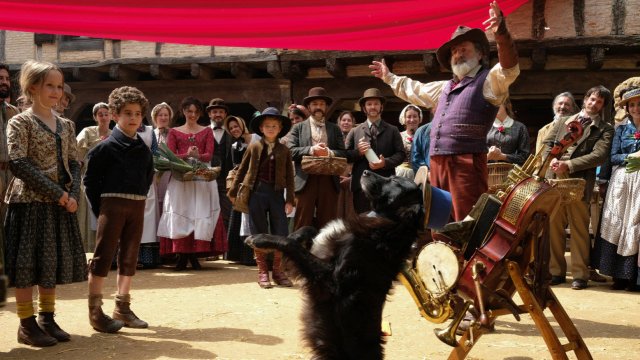Rémi was a good boy; from childhood until now, he had only known how to have his mother; however, when he was eight years old, a series of unfortunate events occurred to him. The "father" she didn't realize she was expecting did not appear out of nowhere, becoming her obsession while also revealing that they are not her biological parents. Rémi, whose only family is his mother, Barberine, is now separated from him, having to be thrown out into the world to work with an old circus man named Vitalis. Something like this happened from the beginning of the story.
When Rémi's journey with Vitalis began, with each chapter being a small situation, I was concerned that the book's more than 600 pages would be filled with such small stories, which would be tedious to read. But, very soon after the first incident, the boy Rémi's life began to spiral into a series of misfortunes that showed no signs of abating. At this point, all I can hope for is that she can return to that "boring" period, living a life that is miserable but still contains the ostensible joy and happiness. Rémi's experiences can sometimes be pushed to levels I can't even imagine.
But, thankfully, there are good people in those trials, a place for me to rely on. Everything is described as so beautiful, so peaceful, both in terms of life and humanity, when I find that landing, when I find a place I can call home. But fate did not forget me; just as Rémi and the reader seemed to be sinking into those happy days, it reappeared, swept me out of my temporary clinging position, and sucked me into its vortex.
However, this is not a tragic story. There are many sad stories along my journey, but there are also many happy ones. Readers expect and believe that true happiness will come to Rémi, in addition to her optimistic personality.
The story is told in the first person, from the perspective of an adult reflecting on his childhood, so the voice is more mature than in other children's books I've read. The text has more depth as a result, but that does not mean that the story is dry; the more we read it later, we will realize that hidden in that maturity is still the innocence and innocence of children, and children who read it will feel sympathy.
This is a touching story. Following Rémi's every move taught me the meaning of adversity. It's heartbreaking to read the scene in which she and her companions happily nibbled on every last piece of bread and then had to starve themselves to exhaustion. Continue reading to learn how nature's rigors far outweigh human endurance. Since then, I've become more grateful for what I have.
Rémi's character has many good qualities; no matter how difficult and dire the situation is, she is unaffected (aside from the fact that she is a bit arrogant with her thoughts in the latter part, which I don't like). I treat those I call father and mother in accordance with my duty as a child, regardless of how different things are from my expectations. The model of a kind, hard-working, honest character who suffers many disadvantages and sufferings is very old; the content of this book has been written for a long time, so it is like that. That's what I assumed. No, the author provides much more through the character Mattia, Rémi's companion from the middle to the end of the book.
Mattia is a good child who is respectful, but unlike Rémi, she is also sensitive and understanding of life. Rémi and Mattia are both aware of the unfortunate situations that have occurred to them, but while Rémi is resigned, Mattia attempts to obtain justice for her. The story concludes with Mattia ensuring that justice is served more quickly. I honestly don't know how much longer Rémi will suffer without Mattia.
It is clear that the author is very skilled at creating the characters' images. If you want to be an exemplary character, look to Rémi. But it is Mattia, not Rémi, who will have an easier and better life. This assists the story in promoting good virtues while still bringing reality, which can last a long time with time. Parents can safely teach their children the moral standards outlined in this book while also drawing the line between "nice" and "foolish" in order to "update" them. Standards are more adaptable to external social realities while retaining core moral values.
The story introduces an important detail in the first third of the book; when I read it, I assumed it was a story written a long time ago, so the author's intentions were revealed; reading to the end, there should be no surprises. But no, the author is more skilled than I thought; until the end, he had me spinning like a pinwheel, not only surprised but also unsure of how the story would unfold. Finally, the author arrived at a very reasonable conclusion. The book's final chapter will leave those who have followed Rémi's difficult path satisfied and emotional.
Rémi and Mattia's family, human, and special love and friendship are so sacred and touching. A beautiful ending that touches people's hearts and takes readers through many levels of emotions, from sadness to joy to Rémi's happiness. And what I remember most are the anxious moments when I worry that the lovely dog Capi will abandon Rémi one day.




